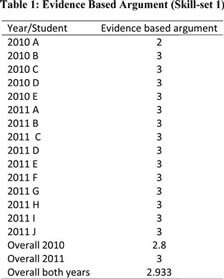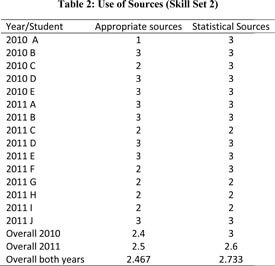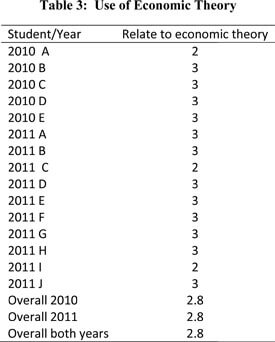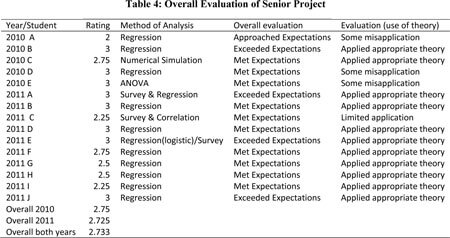Developing Economics Students’ Research Skills in a Writing Intensive Online Environment
Published in:
November 18–19, 2011
University of Puerto Rico, Rio Piedras and University of the Sacred Heart
San Juan, Puerto Rico
1. Introduction
For many college students completing a written research project is one of the most daunting challenges that they face. The well-executed written research project is one of the most valuable assignments for students to complete during their four years of college studies, especially for economics graduates who will likely be turning out analytical and empirically based studies on a variety of business and policy-oriented issues throughout their working careers.
Teaching students these research skills using the online environment, even if it is a traditional face-to-face course is extremely important, as it resembles the research landscape that they will face in the work environment. This research focuses on the analysis of the outcomes and results of the applied economics programs’ senior writing seminars that all applied economics students completed for their bachelor’s degree. Of particular interest is the degree to which students were able to undertake and implement an empirically based economic analysis, using appropriate source materials, and effectively communicate their results.
Over the last two decades, a growing body of literature has developed on the issue of the use and effectiveness of writing in undergraduate economics education (Docherty et al, 2010). Greenlaw (2003) finds significant differences in student learning outcomes between economics courses based upon whether there was a writing component. Students who were required to regularly complete written assignments in two otherwise identical courses scored significantly higher on the same exam instruments than students who were enrolled in a traditional chalk and talk course. Based upon survey results of graduates from their economics program, Simpson and Carroll (1999) conclude that program graduates found that the skills that they had gained from economics courses utilizing a “writing in the curriculum” methodology had been extremely valuable in the course of their employment and graduate study. Cohen and Spencer (1993) report that students in history of economic thought courses using elements from the writing in the curriculum methodology developed greater understanding and ability to argue economic concepts than students in their previous classes that had relied more on traditional chalk and talk methods.
Wright (1999) and Santos and Lavin (2004) find that students taught using an empirical research approach—i.e. students are required to collect and analyze data, present their findings using common reporting tools such as Excel, and explain the results of their analysis—experienced improved retention of macroeconomic concepts. These types of exercises help students to build and retain skill sets that they will likely utilize throughout both their college and professional careers.
McGoldrick (2008A) reports that only 49% of undergraduate programs in economics required a senior writing component for students to complete their degrees. In a separate study, McGoldrick (2008B) examines the importance of a capstone writing experience. This analysis focuses particular attention upon a process orientation to the conduct of research and writing as opposed to a content-oriented approach. McElroy (1997) describes a senior capstone experience where not only do the students complete a research study, but the course instructor works alongside the students on a similar study to more fully mentor the students through the process as well as demonstrate more completely the research project.
This paper analyzes the outcomes of the two most recent senior capstone writing courses in the Applied Economics curriculum at Farmingdale State College. This program is now entering its fourth full year of operation, and graduated its first class of students in 2010. Five students completed the capstone sequence of writing courses in the 2009-2010 academic year; ten students completed it this past academic year. Section 2 describes the writing sequence courses and process that the students follow to complete their senior projects. The outcomes of student projects are analyzed in Section 3. Section 4 presents the conclusions of this study.
2. Courses Assessed
As part of the core, the capstone writing sequence is designed to develop students’ analytical skills and enable graduates to undertake and complete economic and policy-oriented research independently. Students take two courses, Economics Research and Reporting (ECO 490W) which is followed by Applied Economic Analysis/Senior Project (ECO 491). In the first course, students receive extensive instruction in the methods and techniques of economic research and report writing, including data and statistical analysis, and the generation and presentation of reports for the general public (Vogel 2011). Applied Economic Analysis/Senior Project is a seminar style course in which students complete and present the results of an applied research project in an area of their own choosing.
The first year that ECO 491 was offered, it was taught in an online format. Though it was technically an online course, students were required to meet with the instructor every two to three weeks to discuss and report on their progress. They also were asked to submit preliminary components of their research at various points throughout the semester including their initial research topic, preliminary references and data sources, an outline or plan for their research, and their preliminary empirical analysis. Students were expected to submit both their completed papers and a PowerPoint presentation approximately two weeks before the end of the semester. They were then required to present their completed studies at one of our regularly scheduled Applied Economics seminars.
The following academic year, the course was offered as a hybrid course which met once a week in a seminar format for seventy-five minutes. Each class meeting consisted of a short instructor led discussion of research-related issues, and student-introduced discussions of various issues and problems that they were encountering in the conduct of their own research. Additionally, students were asked to submit and present various aspects of their research as they progressed through the semester just as they had been required to do in the previous year. Thus students were expected to submit a short statement of their research topic and hypothesis, a preliminary bibliography and data sources, an outline, and a preliminary empirical analysis. Just as the case with the previous year, students were required to submit their PowerPoint presentation approximately three weeks before the end of the semester, and their fully completed paper a week later. Completed projects were presented during the last two class sessions of the semester and one Applied Economics seminars.
3. Analysis
The senior project essentially asks the students to integrate and apply the concepts, knowledge, methods, and techniques that they have learned and been exposed to through their coursework at Farmingdale. There are three skills in particular that students should develop through their studies in the Applied Economics program:
- The ability to develop an evidence-based argument;
- That they can identify and use appropriate electronic databases and internet-based resources to locate and find the information to support their arguments; and
- And that they can relate their evidence to one or more underlying foundational concepts of modern economic analysis.
Student papers from the ECO 491 courses offered during the spring semester of 2010 and 2011 are analyzed to evaluate how effectively students met these goals. In particular, students’ methods of analysis, reference sources, and data sources are evaluated against the above criteria.
Fifteen students have completed the course, five in 2010 and ten in 2011. While the sample sizes are too small to conduct a full statistical analysis, they are sufficient to provide a preliminary indication of how successful students and the program have been in accomplishing these goals. Program enrollments are forecast to be approximately 50 students within the first five years of operation, or in other words, the addition of nine to twelve students annually. The program has met its projected enrollment growth for the last three years, and fifteen students represents close to 40 percent of total enrollments to date.
Student attainment of the three skill sets are presented in Tables 1 through 3. Skill sets are sorted according to degree of attainment. In particular, students use of statistical methodology (simple graphical and presentation of raw data to more advanced statistical and econometric methods such as regression analysis), data and reference sources, and how effectively students actually applied specific economic theory to their analysis are rated using a Likert ranking scale from 1to 3 (1 the lowest, and 3 the highest rating). Table 4 shows the overall level of attainment towards meeting goals 1 through 3, specific types of analysis utilized, and how well students applied economic concepts/theory.




Overall, students were successful in making evidence based arguments (Table 1) with only one student scoring below a 3 on this particular item. It would appear that the program and the course are achieving this stated goal. With regard to the students’ use of sources, this goal is decomposed into two components—appropriate economic and background literature, and appropriate statistical sources. The evidence here is a little more mixed (Table 2). While the overall averages for 2010 and 2011 are 2.4 and 2.5 respectively for use of appropriate literature, there was much greater variation across students. With respect to statistical sources, students did appear to score higher, with all students using appropriate sources in 2010 (a score of 3), and a score of 2.6 overall for 2011. This would suggest that perhaps more student attention and mentoring needs to be given to this particular aspect of students’ research skills.
Regarding the use of economic theory, students do appear to be satisfying this goal with an overall rating of 2.8 for both 2010 and 2011 (Table 3). With only one exception, all students did meet or exceed expectations in completing their senior projects (Table 4). In terms of the appropriateness of the individual analysis in each student paper, with the exception of four papers, all students did apply the appropriate economic concepts and theory to their analysis. Of the other four papers there was some minor misspecification of economic concepts in three of the papers, and the fourth applied only limited economic theory. Students across the two years achieved a rating of 2.73 in terms of overall evaluation. Regression analysis was the most common method used by the students, with only three students across the two years using an alternate method. This result is not extremely surprising as students do take two formal courses in statistical methods, one of which is econometrics. A number of the students in 2011 also took a third advanced course forecasting one of their upper level electives.
4. Conclusions
The senior research paper is part of the overall portfolio that students can then show potential employers after graduation. Thus it is important they demonstrate the various skills that these future employers will likely require them to utilize. These skills are developed though not just one course, but across a student’s college career. The senior research seminar focuses student’s attention upon both research and writing skills and the process of conducting economic research and is process as opposed to content driven.
Overall, it does appear that the capstone research and writing sequence in the applied economics program is achieving its goals. Students are successfully applying the various methods of analytical analysis that they have studied in their prior economics courses to create their own independent analysis. While the analysis above does find that there are still areas of concern, especially with regard to students’ foundational research skills in terms of use of appropriate sources, students appear to be meeting overall program goals. Moving the courses from the online to the hybrid format has resulted in some improvements in student performance, especially as it created a greater sense of shared community and introduced students to a more interactive environment that is similar to what they will likely encounter in the workplace.
References
Cohen, A. J. & Spencer, J. (1993). Using writing across the curriculum in economics: is taking the plunge worth it. The Journal of Economic Education, 24(3), 219-229.
Docherty, P., Tse, H., Forman, R., & McKenzie, J. (2010). Extending the principles of intensive writing to large macroeconomics classes. The Journal of Economic Education, 41(4), 370–382.
Elliott, D., Meisel, J. & Richards, W. (1998). The senior project: using the literature of distinguished economists. Journal of Economic Education, 29(4), 312-320.
Greenlaw, S. A. (2003). Using writing to enhance student learning in undergraduate economics. International Review of Economics Education, 1(1), 61-70.
McElroy, J. L. (1997). The mentor demonstration model: writing with students in the senior economics seminar. The Journal of Economic Education, 28(1): 31-36.
McGoldrick, K. (2008A). Writing requirements and economic research opportunities in the undergraduate curriculum: results from a survey of departmental practices. The Journal of Economic Education, 39(3): 287-296.
McGoldrick, K. (2008B). Doing economics: enhancing skills through a process-oriented senior research course. The Journal of Economic Education, 39(4): 342-356.
Santos, J. and Lavine, A. M. (2004). Do as I do, not as I say: assessing outcomes when students think like economists. The Journal of Economic Education, 35(2): 148-161.
Simpson, M. S. and Carroll, S. E. (1999). Assignments for a writing-intensive economics course. The Journal of Economic Education, 30(4): 402-410.
Vogel, R. (2011). Global problems, accessible data, and technology in social science research. Engaging Students in the Community and the World: A National Symposium. NETWORK: A Journal of Faculty Development. Retrieved from: http://www.nyu.edu/frn/publications/engaging.students/index.html
Wight, J. B. (1999). Using electronic data tools in writing assignments. The Journal of Economic Education,30(1): 21-27.
Spring 2012: Emerging Pedagogies for the New Millennium
